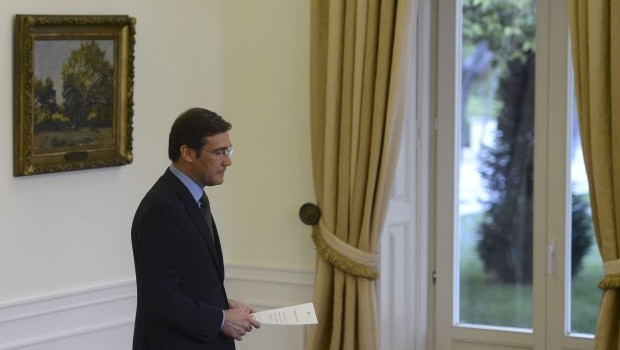
Portuguese Prime Minister Pedro Passos Coelho addresses the nation from his official residence at Sao Bento palace in Lisbon on July 2, 2013. Source: AFP Photo/Francisco Leong
Lisbon, AP—Portugal’s financial markets went into a steep nosedive Wednesday as the government teetered on the verge of collapse, alarming investors and reigniting concerns about the eurozone’s strategy for dealing with its prolonged financial crisis.
Prime Minister Pedro Passos Coelho defied calls to resign late Tuesday but he was running out of options to keep his center-right coalition government together following the resignations of key ministers in a spat over austerity.
Portugal is locked into a program of tough budget cuts demanded by its fellow euro countries, the European Central Bank and the International Monetary Fund in return for a EUR 78 billion (USD 102 billion) bailout two years ago.
Leaders of the 17 European Union nations that share the euro currency, known as the eurozone, have insisted on cuts in countries like Portugal that have a heavy debt burden. But Portugal is now facing the likely prospect of austerity-inspired strife of the kind that has dogged Greece and compelled it to ask for a second bailout. As well as drawing criticism from opposition parties, trade unions and business leaders, the austerity program has been a drag on Portugal’s economy and unemployment is stuck at 17.6 percent.
If Portugal doesn’t abide by the austerity program, its bailout creditors could halt the disbursement of funds, potentially leaving it unable to pay what it owes.
That development “could trigger a sovereign default and potential removal from the eurozone, with contagion spreading across to Greece, a country that is currently struggling to secure its next tranche of aid money,” Ishaq Siddiqi of ETX Capital said Wednesday.
Portugal’s main PSI 20 stock index plunged 6.4 percent to 5,177 in late morning trading Wednesday. Another indicator of investor confidence in a country, the interest rate on Portugal’s benchmark 10-year bond, hit 7.39 percent—up from 5.23 percent in May but nonetheless lower than the 9.77 percent it was at this time last year.
Portuguese Foreign Minister Paulo Portas, the leader of the junior party in the center-right coalition government, quit on Tuesday in protest against plans to continue with tax hikes and pay and pension cuts.
The previous day, Finance Minister Vitor Gaspar walked out, saying he lacked political and public support for his austerity strategy.
Passos Coelho, the prime minister, said in a nationally televised address that he will fight to keep his Cabinet together, “but resolving the problem doesn’t only depend on me.”
He said he will speak to Portas, head of the Popular Party, in an attempt to resolve their differences. Portas did not say whether he would pull his party out of the government—a step which would leave Passos Coelho without the majority in Parliament he needs to enact his policies.
Antonio Seguro, leader of the main opposition Socialist Party who has called for new elections, was due to meet later Wednesday with President Anibal Cavaco Silva. The head of state has the power to dissolve Parliament and call a ballot, though he has expressed reluctance to take that course.
